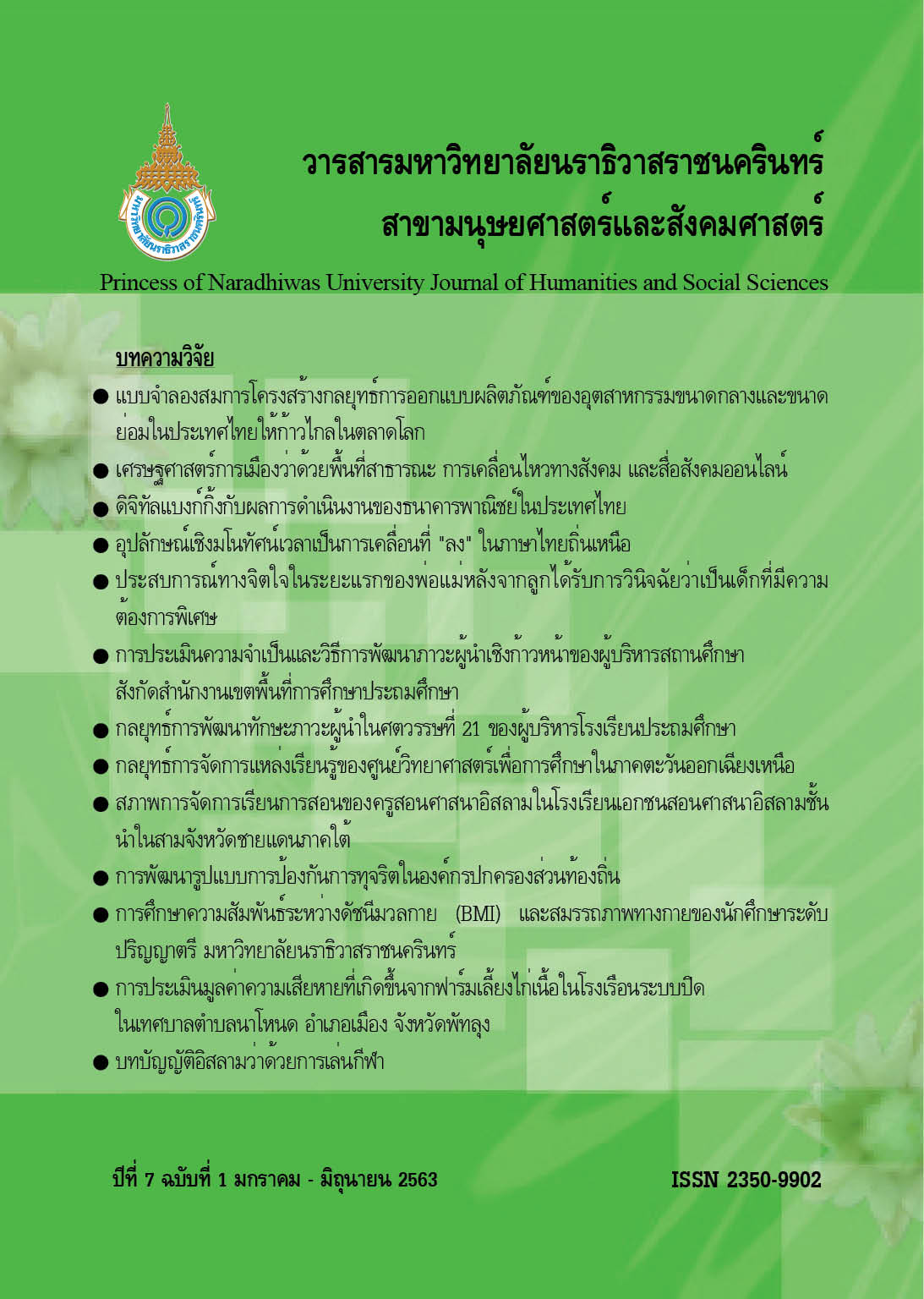Leadership Skill Development Strategies for the 21st Century of Primary School Administrators
Main Article Content
Abstract
The purposes of this study were: 1) to study component factors and indicators of the leadership skills for the 21st century of primary school administrators, 2) to study the current and desirable conditions of leadership skills for the 21st century of primary school administrators and 3) to develop the strategies for development of leadership skills of the 21st century of primary school administrators. The research was a mixed methods studies. Sample groups were 370 school administrators and teachers under Khon Kaen primary education service area, using stratified random sampling method, 12 experts and 30 stakeholders. The research tools were questionnaire on the current and desirable conditions of the leadership skills for the 21st century of primary school administrators and strategy evaluation form. The statistics were used to analyze data; percentage, standard deviation and need priority index (PNImodified).
The research results were as follows:
1) Leadership skills for the 21st century of primary school administrators consisted of 4 key factors and 13 indicators. The factors were: 1) communication skills with 3 indicators, 2) creativity skills with 4 indicators, 3) visionary skills with 3 indicators and 4) collaboration skills with 3 indicators. The evaluation of factors and indicators were found at "suitable" level.
2) The current leadership skills for the 21st century of primary school administrators, as a whole and each individual factor, were at moderate level. The desirable leadership skills for the 21st century of primary school administrators, as a whole, were at high level which the highest part is visionary skills.
3) The leadership skill development strategies for the 21st century of primary school administrators consisted of 4 strategies with 21 measures and 36 indicators. The strategies were as follows: Strategy 1 was to strengthen leadership skills in the 21st century focusing on vision with 5 measures and 10 indicators, Strategy 2 was to enhance the ability to use technology in communication with 4 measures and 7 indicators. Strategy 3 was to empower creative and innovative skills with 8 measures and 10 indicators, and strategy 4 was to raise the level of collaboration with 4 measures and 9 indicators.
Article Details
References
บุญช่วย สายราม. (2562). ทักษะภาวะผู้นำสำหรับผู้บริหารสถานศึกษาในศตวรรษที่ 21.
เข้าถึงได้จาก http://wetoknows.blogspot.com/?m=1
(วันที่สืบค้นข้อมูล :1กันยายน 2562).
ประครอง บุญครอง. (2558). กลยุทธ์การพัฒนาภาวะผู้นำของผู้บริหารสถานศึกษาขั้นพื้นฐาน สังกัด
สำนักงานคณะกรรมการการศึกษาขั้นพื้นฐาน. วิทยานิพนธ์ปริญญาครุศาสตรดุษฎีบัณฑิต.
สาขาการบริหารการศึกษา มหาวิทยาลัยราชภัฏอุบลราชธานี.
พิณสุดา สิริธรังศรี. (2555). รายงานการวิจัยเรื่องภาพการศึกษาไทยในอนาคต 10-20 ปี.
กรุงเทพฯ: สำนักนโยบายและแผนการศึกษา.
เรวัตร์ ชาตรีวิศิษฏ์ และคณะ. (2554). การบริหารจัดการเชิงกลยุทธ์. กรุงเทพฯ: บริษัท
พิมพ์ดี จำกัด
วรากรณ์ สามโกเศศ และคณะ. (2010). ข้อเสนอทางเลือกระบบการศึกษาที่เหมาะสมกับสุข
ภาวะคนไทย. สำนักงานกองทุนสร้างเสริมสุขภาพ. กรุงเทพมหานคร: โรงพิมพ์
ภาพพิมพ์
วิโรจน์ สารัตนะ. (2556).กระบวนทัศน์ใหม่ทางการศึกษากรณีทัศนะต่อการศึกษาศตวรรษที่21.
กรุงเทพฯ : หจก.ทิพยวิสุทธิ์.
วิทยากร เชียงกูล. (2009). รายงานการสังเคราะห์ผลการวิจัยปฏิรูปการศึกษาของประเทศ
ฟินแลนด์ นิวซีแลนด์ เกาหลีใต้ สหรัฐอเมริกา สหราชอาณาจักร จีน เวียดนาม
และไทย. (เอกสารอัดสำเนา).
สุกัญญา แช่มช้อย. (2555). แนวคิดเชิงนวัตกรรมสำหรับสถานศึกษาในศตวรรษที่21.
เข้าถึงได้จาก https://www.tci-thaijo.org/index.php/edujoumal_nu/article/view/
9391/8501. (วันที่สืบค้นข้อมูล : 22 กุมภาพันธ์ 2559).
สุพรรณ ประศรี. (2555). การศึกษาความสัมพันธ์ระหว่างภาวะผู้นำเชิงกลยุทธ์ของ
ผู้บริหารสถานศึกษากับการดำเนินการประกันคุณภาพภายในสถานศึกษาสังกัด
สำนักงานเขตพื้นที่การศึกษาพระนครศรีอยุธยาเขต 2. (วิทยานิพนธ์ปริญญา
มหาบัณฑิต, มหาวิทยาลัยราชภัฏมหาสารคาม).
สำนักงานเลขาธิการสภาการศึกษา. (2556ก). ยุทธศาสตร์การพัฒนาคุณภาพการศึกษา:
ระเบียบวาระแห่งชาติ (พ.ศ. 2551-2555). กรุงเทพฯ: พริกหวานกราฟฟิค.
Lee, D. M. (2008). Essential Skills for Potential School Administrators: A Case
Study of One Saskatchewan Urban School Division. University of
Saskatchewan: Saskatoon.
NASSP. (2013). Breaking Ranks: 10 Skills for Successful School Leaders.[online].
Available From http://www.nassp.org/Content/158/BR_tenskills_exSum.pdf
[Accessed 1 April 2013].
Waston. (2000).Behavior: An introduction to comparative behavior. NewYork:
McGraw-Hill.


